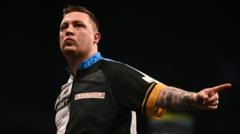Is Online Abuse in Tennis as Horrifying as BBC Sport's Croft Suggests?

The Alarming Rise of Online Abuse in Tennis: A Deep Dive
In recent years, online abuse has escalated into a pervasive issue affecting athletes across various sports, and tennis is no exception. The recent revelations by British number two Katie Boulter shed light on this troubling trend, prompting discussions around the responsibilities of fans, the role of social media platforms, and the mental health of athletes. This article delves into the scale of online abuse directed toward tennis players, the psychological impact it has, and what can be done to combat this growing problem.
The Reality of Online Abuse in Tennis
Despite the glamour and prestige that comes with professional tennis, players often face a dark side of the sport—online harassment. Social media platforms, while providing a space for fans to connect with their favorite athletes, have also become breeding grounds for negativity and abuse. Katie Boulter, along with several other players, has recently spoken out about the distressing messages they receive, which can range from hateful comments to threats.
Such abuse can have severe consequences, affecting not only the mental health of the athletes but also their performance on the court. Players like Boulter have bravely shared their experiences, opening a dialogue that is crucial for addressing the issue. The question that arises is: how can we protect athletes from the toxicity that lurks in the digital spaces?
The Scale of the Problem
Online abuse in tennis is not an isolated issue. It represents a larger societal problem where anonymity on the internet emboldens individuals to express themselves in harmful ways. According to various studies, the prevalence of online harassment is staggering:
- Over 70% of professional athletes have reported experiencing some form of online abuse.
- Women in sports, including tennis, are disproportionately targeted compared to their male counterparts.
- Many players have indicated that they have considered quitting the sport due to the mental toll of such abuse.
This troubling data highlights the urgent need for action. The anonymity afforded by social media platforms often makes it difficult to hold perpetrators accountable. As athletes like Boulter bravely share their stories, it becomes increasingly clear that change is necessary to protect their well-being.
The Psychological Impact of Online Abuse
The mental health implications of online abuse are profound and often overlooked. For professional athletes, who already face immense pressure to perform, the added strain of dealing with negative comments can be debilitating. Some of the psychological effects include:
- Anxiety: Constant online harassment can lead to heightened levels of anxiety, making it difficult for players to focus on their game.
- Depression: The emotional toll can spiral into depression, affecting both personal and professional lives.
- Self-esteem Issues: Continuous negative feedback can erode an athlete's confidence, impacting their performance on and off the court.
Understanding these consequences is crucial for fans and the general public. Athletes are humans, and they are affected by what is said about them online. As viewers, we must remember that behind every player is a person who deserves respect and dignity.
Social Media's Role in Amplifying Abuse
Social media platforms like Twitter, Instagram, and Facebook have transformed the way fans interact with players. While this has many positive aspects, it has also contributed to the rise in online abuse. The following factors play a significant role:
- Anonymity: Users can create accounts without revealing their identities, allowing them to act without accountability.
- Instant Communication: The immediacy of social media means that negative comments can be shared and amplified in seconds.
- Lack of Regulation: Many platforms do not have stringent measures in place to combat harassment, leaving athletes vulnerable.
As a result, the responsibility falls not only on the users but also on the platforms themselves. There is a growing demand for social media companies to implement stricter policies to protect public figures and athletes from online abuse.
What Can Be Done to Combat Online Abuse?
Addressing online abuse requires a multi-faceted approach involving players, fans, social media platforms, and governing bodies. Here are some key strategies that can help mitigate the problem:
1. Increased Awareness and Education
Raising awareness about the impact of online abuse is crucial. Campaigns that educate fans on the consequences of their actions can foster a more respectful online environment. Initiatives can include:
- Workshops and seminars focusing on digital etiquette and the importance of supporting athletes positively.
- Social media campaigns that highlight the stories of players affected by online abuse.
- Collaborations between tennis associations and mental health organizations to promote awareness.
2. Stricter Policies from Social Media Platforms
Social media companies must take a proactive role in combating online abuse. This can be achieved through:
- Implementing stricter guidelines for user behavior and consequences for violators.
- Enhancing reporting systems to make it easier for athletes to report abuse.
- Investing in technology to detect and block harmful content before it reaches the target.
3. Support Systems for Athletes
It is essential to provide athletes with the tools and resources they need to cope with online abuse. This can include:
- Access to mental health professionals who understand the unique pressures faced by athletes.
- Creating safe spaces where players can share their experiences and seek support.
- Encouraging open dialogue among players regarding their mental health and coping strategies.
The Role of Fans in Creating a Positive Environment
Fans play a pivotal role in shaping the culture surrounding sports. By promoting positivity and respect, they can significantly reduce the prevalence of online abuse. Here are some actionable steps fans can take:
- Practice empathy: Remember that athletes are human beings with feelings and challenges.
- Support positive interactions: Share uplifting messages and celebrate players' successes.
- Call out abuse: Stand against negative behavior by reporting abusive comments and encouraging others to do the same.
Ultimately, fostering a supportive community can create an environment where athletes feel safe and valued.
Conclusion
The issue of online abuse in tennis is a pressing concern that affects not only the athletes but the integrity of the sport itself. As figures like Katie Boulter bravely share their experiences, it serves as a wake-up call for fans, social media platforms, and governing bodies alike. By working together, we can create a safer, more respectful environment for athletes to thrive both on and off the court.
As we reflect on this serious issue, it’s essential to ask ourselves: What can we do to be part of the change that helps eliminate online abuse in sports? Together, we can nurture a culture of respect and support that uplifts our athletes rather than bringing them down.
Frequently Asked Questions
What constitutes online abuse in tennis?
Online abuse in tennis can include hateful comments, threats, bullying, and any form of harassment directed toward players on social media platforms.
How can athletes cope with online abuse?
Athletes can cope with online abuse by seeking support from mental health professionals, engaging in open conversations with fellow players, and utilizing resources provided by their sports associations.
What actions can social media platforms take to prevent online abuse?
Social media platforms can implement stricter user guidelines, improve reporting systems, and invest in technology to detect and block abusive content proactively.
As we move forward, let’s join hands in promoting respect and positivity in sports. Together, we can create a safe haven for athletes to excel without fear of online abuse. #Tennis #MentalHealth #OnlineAbuse
Published: 2025-06-17 15:33:13 | Category: sport



